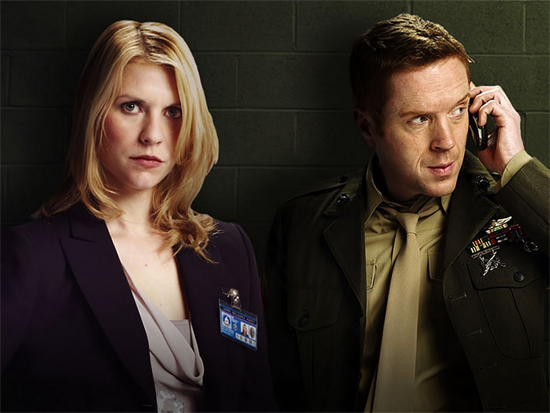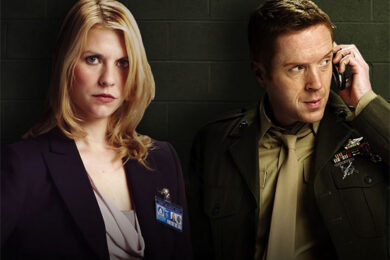Is Nicholas Brody – MIA presumed dead for eight years in Iraq, now returning war hero – a terrorist sleeper? This is the question at the centre of Homeland. Except it isn’t. As befits ‘a post-9/11 world™’ the search for the answer throws up more questions.
To its credit, while happy to thoughtfully explore the validity of the War on Terror and the questionable methods of the ‘good guys’, it doesn’t descend into a sixth form ethics debate. It remembers that it’s a television show. Rather than offer answers, Homeland trades in ambiguity.
The plot revolves around Brody (Damien Lewis) and Carrie Mathieson (Claire Danes), the returned marine and the CIA agent who suspects him, locked in a perilous ever-decreasing orbit. Lewis pitches Brody just right, the ‘strong, silent’ type balanced with the ‘silent, potentially malevolent’ type. Recently freed from a trauma and desperate to return to normality, struggling to find the balance, it feels like he could boil over at any point. A complicated domestic life lends itself to emotional turmoil and is the perfect foil to theories of conspiracy.
Danes is good, but not quite as good as Lewis. A sympathetic portrayal of mental ill-health brings a humanity to someone who is quite often petulant and rash. Danes’ maverick CIA agent avoids cliché, just. She is saved by the fact that is just about professional enough, and is on the receiving end of a reassuring number of bollockings. She knows an American soldier has been turned, she clings to that one (apparent) fact like a life vest in a sea of skulduggery. Domestic lives (and in Brody’s case also flashbacks) neatly add notes of ambiguity. By placing us alongside the surveillance teams Homeland avoids clumsy exposition.
The supporting cast is (mostly) excellent. Mathieson’s old-hand but jaded mentor Saul Berenson (Mandy Patinkin) is obviously sympathetic to his charge, sometimes cutting her a little too much slack, reining her in with an upbraiding. Brody’s children – a rebellious daughter and a son too young to remember his dad – demonstrate wonderfully his absence and attempts to return to normality.
It becomes more apparent as time goes on that the Brody/Mathieson relationship is not the be all and end all, as each new character adds complexity. Homeland understands how much of human interaction is based on assumptions (right or wrong). There are very few facts, very little evidence. We’re left with an ever growing pile of opened Russian dolls scattered around us. It doesn’t give anything away to suggest that, with the exception of Brody’s kids (so far at least), no one is above suspicion. Everyone has a secret, be they pill-popper, adulterer, pothead, or potential mass murderer.
Plots and subplots tessellate outward as more people are drawn in, and we are forced to reconsider past actions, conversations, silent looks, movements of the hand. Dense paranoia permeates the show. Every interaction is framed as an interrogation, sometimes benign or prosaic, but always needling for information. Deft use of mirroring makes people’s actions more poignant and revealing. Mathieson is at her best when she’s ‘right’, focussed and at her most stable, while those around her (most notably Saul) fall apart.
There are potentially important disjoints between what Brody says and what he thinks. Some viewers have complained about “gratuitous” sex, but there is difference between loveless ‘graphic’ sex and people in love who can only manage unsettling, awkward liaisons. The former are just the right side of progressing plot, the latter thrown in to sharp relief.
Visually this works too, with Mathieson and Brody’s body language, in their evening routines: the former monitoring the latter at home on an illegally installed surveillance kit. This answer to 24‘s split-screening of simultaneous events – a literal watching of several images – is an artful nod to anticipated comparisons with the Kiefer Sutherland vehicle. But here it isn’t about cramming more action in. Rather, it’s a device to assist character development. Watching the watchers ensnares us. Our privileged position as audience, knowing and seeing everything, makes the CIA’s – Mathieson particularly – one-eyed certainty about Brody a kind of inverted dramatic irony.
Homeland raises interesting questions about means and ends, but never gets too preachy. Carrie uses illegal surveillance, is reckless with other people’s lives, and the US mantra of “we don’t use torture” is spoken ahead of some very end-of-the-grey-area interrogations. Mathieson the loose cannon is supported by a number of others, equally at ease with questionable methods, where choices often come from having no better idea how to proceed.
The show isn’t without flaws, though. A ridiculous lack of security protocol infects everyone in the CIA (in corridors, out at bars, over the phone). Carrie and Saul in particular seem alarmingly blasé about their conversations, especially given the ‘free rein’ nature of some of Mathieson’s actions. There are also some very clumsily telegraphed twists – Tinker, Tailor-esque glacial tension isn’t always necessary, but Homeland is often too blatant for its own good. That said, some twists transpire to be double/triple bluffs, so maybe the viewer is intentionally being played for a fool.
Ultimately, Homeland suffers from a split personality: the serious, considered drama versus the cartoon. The oft-repeated line was that it’s a ‘liberal 24‘, which, while sounding like lazy journalism, does help frame some of the show’s weaknesses. But whereas 24 had double agents and quintuple twists, the dividing lines were always more black-and-white. Here, there are numerous sides to choose from: in the (perceived) conspiracy, in the home, in the office, between friends, between colleagues, between husband and wife.
With the exception of one off-kilter episode so far, Homeland has displayed an ability to reward patience and attention to detail while still barreling along and being a lot of fun, teasing and wrong-footing us, drawing us in ever deeper. At the halfway point I was left so woozy and disorientated by the whole thing that I wasn’t even sure if I could trust myself not to be a terrorist sleeper.
Homeland continues on Channel 4, Sunday nights at 9pm



